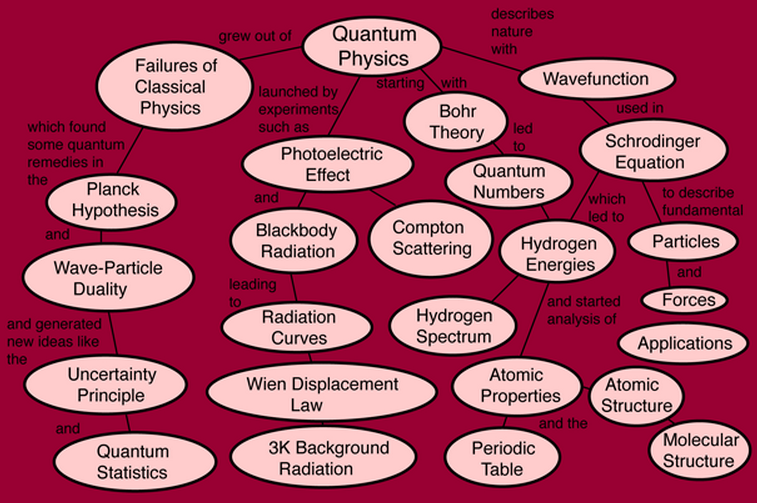Anchoring for Meaning
In the previous article to this one I wrote about how, in order to remember something new, it's necessary to link new knowledge to existing knowledge. We called this existing knowledge ‘memory anchors'. There are two main ways that we can link new knowledge to old knowledge. The first is anchoring for meaning and the second is through using mnemonics. This article addresses the former. Anchoring for meaning is a much stronger way of building memory connections than mnemonics is. Anchoring for meaning means we logically connecting ideas in ways that reflect how those concepts are actually linked in the real world*. For example, if you're trying to learn about derivatives by exploring how velocity is related to displacement, that's great, because in real life velocity is the derivative of displacement. But if you're trying to understand the derivative through a mnemonic that you've made up about tweedle dum and tweedle dee, it might not stick as well.  *The most effective way that I've come across of explicitly anchoring for meaning is through the use of concept maps. Above is an example of how the website Hyperphysics helps its visitors to anchor for meaning when learning about Quantum Physics. Hyperphysics is an amazing site and whenever I want to know anything about Physics (eg: Newton's Laws) I usually just type into google “Newton's Laws Hyperphysics” and there's a high chance of getting a great summary. But it's not just sticking power that makes it important to anchor for meaning when possible. It's recollection power. In order to store your memories in a way that they'll get cued at a relevant time, it's really helpful to store them in a logical way, and the most logical way is by meaning and logical connections. To expand upon our derivative example above, if you learn about the derivative as linking displacement and velocity, then when you come across a question asking you to explore how velocity and acceleration are linked, you're more likely to think that the derivative may have something to do with it (and you'd be right!), but if you've managed to get the derivative concept stuck into your brain via the tweedle dum and tweedle dee mnemonic, the ‘relate velocity to acceleration' question will more likely leave you in wonderland… This fact, that anchoring for meaning means that your memories will be cued at the optimum times is part of a bigger principle. This principle is encapsulated by Daniel Willingham with the phrase “How You Think Determines How You Remember”
*The most effective way that I've come across of explicitly anchoring for meaning is through the use of concept maps. Above is an example of how the website Hyperphysics helps its visitors to anchor for meaning when learning about Quantum Physics. Hyperphysics is an amazing site and whenever I want to know anything about Physics (eg: Newton's Laws) I usually just type into google “Newton's Laws Hyperphysics” and there's a high chance of getting a great summary. But it's not just sticking power that makes it important to anchor for meaning when possible. It's recollection power. In order to store your memories in a way that they'll get cued at a relevant time, it's really helpful to store them in a logical way, and the most logical way is by meaning and logical connections. To expand upon our derivative example above, if you learn about the derivative as linking displacement and velocity, then when you come across a question asking you to explore how velocity and acceleration are linked, you're more likely to think that the derivative may have something to do with it (and you'd be right!), but if you've managed to get the derivative concept stuck into your brain via the tweedle dum and tweedle dee mnemonic, the ‘relate velocity to acceleration' question will more likely leave you in wonderland… This fact, that anchoring for meaning means that your memories will be cued at the optimum times is part of a bigger principle. This principle is encapsulated by Daniel Willingham with the phrase “How You Think Determines How You Remember”
How You Think Determines How You Remember
Let's play a game! Try to remember the objects in capitals (not bold) from the following 3  sentences
sentences
- The violin player lugged the heavy PIANO up the stairs.
- The car salesman took a bite of a juicy APPLE.
- The WALKING STICK was leant upon by the retired sword fighter.
- The boy cracked the EGG when he fell off the fitness ball.
- The vampire was passed right through by the GHOST.
Below I've provided 2 sets of clues to remind you of the key words in the list above. Scroll down so you can no longer see the above list and start by reading the first set of clues. Try to use them as a basis for remembering the 5 objects.
Clue set 1: An instrument, something red, something long and straight, something round, something scary
How did you go? Maybe you got all 5? If you did, well done! If not, maybe this second list will help a little bit more…
Clue set 2: Something that's heavy, Something that's juicy, Something you lean on, Something that cracks, Something that can pass through other things.
If the above example 1 worked well then you will have found the second list much more helpful. Perhaps the first set of clues even made you remember a wrong word from the list! Whilst the first set of clues were all valid clues, the clues didn't mirror the way that you thought about the objects in the first place (ie: the way the sentences described them such as a juicy apple rather than a red apple). This is because as anything makes its way from short term to long term memory, the way that it's thought about whilst in that transition phase influences how it's remembered/encoded and thus, what brings the memory back.

There is one key lesson in this for teachers. When we're designing a lesson plan, and trying to spice it up for students it is VITAL that we ask ourselves ‘what is this activity actually going to make the students think about‘. If we try to teach students about the history of aviation by getting them to make model airplanes, chances are what they'll remember from the lesson is who they managed to hit with their plane rather than who the Wright brothers were. As teachers, our goal is to get students to think about meaning. It's important that, when we can, we introduce content in a way that emphasises its meaning.
What to do when Anchoring for Meaning isn't Possible
There are times when it simply isn't practical to anchor for meaning. This could be if:
- You're starting a learning project into an area where you don't know anything at all yet – eg: If you start to learn a language that seems extremely detached from you own, like Chinese.
- You haven't built up the required background knowledge to make links in a logical way yet, and/or you simply don't have time to do it – maybe you've been slacking off all semester and the test is coming up!**
- If there simply isn't a logical reason why the piece of information is the way that it is – eg: you meet someone and you want to remember their name. (There's usually no logical reason why a person has a certain name, and even if there was one for their parents, there's no guarantee that it will seem logical to you!)
In cases like these we need to revert to a secondary way of anchoring. Mnemonics! Mnemonics refers to a whole suite of memory techniques that can be used when, for whatever reason, you can't manage to Anchor for Meaning. Learn about mnemonics in the next article in the memory series, here.
**BEWARE. Often we can use mnemonics to cut logical-learning corners, but in the long run this only serves to handicap us. The more genuine facts you know about a topic, the easier it is for you to learn more about that topic. If you get into the habit of linking things that you learn to your prior knowledge in abstract ways, you're rate of learning is going to be compromised further on down the track. When you're dealing with subjects where there are logical connections to be made (Maths, Physics, etc) it really is in your best interests to take the time to lay down solid foundations and to REMEMBER those foundations.
Notes:
- Inspired by the example in Why Students don't Like School by Daniel Willingham. Kindle location 1092.
- From Why Students don't Like School by Daniel Willingham. Kindle location 969.